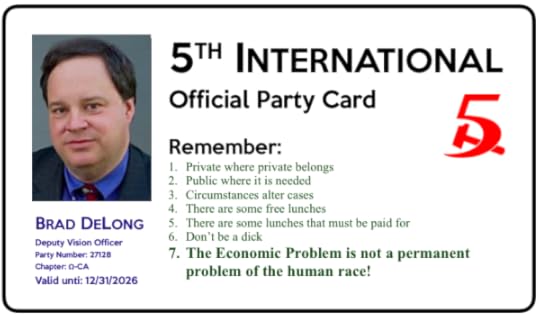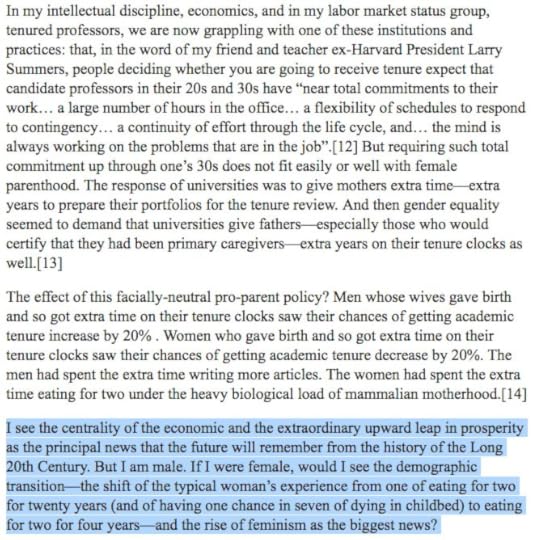J. Bradford DeLong's Blog, page 339
July 13, 2018
The answer is: probably in the late 1960s: Joe McMahon: W...
The answer is: probably in the late 1960s: Joe McMahon: When was the last time all the computing power in the world equaled one iPhone?: "When was the last time all the computing power in the world equaled one iPhone?...
...The iPhone 5's A6 processor is a dual-core, triple-GPU device. The first multiprocessor computer was the Burroughs D825 (defense-only, of course-http://BRL64-0052.jpg), with 1 to 4 processors, running at ~ .070 s / 1 1operation = ~14 FLOPS for divide,�� the slowest operation, 166 FLOPS for add, the fastest, and ~25 FLOPS for multiply. Let's assume adds are 10x more frequent than multiply and divide to come up with an average speed of 35 FLOPS per processor, so 70 FLOPS for a 2-processor D825, handwaving CPU synchronization, etc.... To meet the worst performance of the iPhone 5 chip with the most optimistic estimate of the Burroughs D825's performance, you'd need 4.6 million of them. I can state confidently that there were not that many Burroughs B362s available in 1962.... in 1960, there were in total about 6000 computers....
Let's move forward. The CDC 7600, in 1969, averaged 10 MFLOPS (with hand-compiled code, and could peak at 35 MFLOPS). Let's go with the 10 MFLOPS-to equal a single iPhone 5, you'd need 32 of them. Putting aside the once-a-day (and sometimes 4-5x a day) breakdowns, we're in the realm of possibility that the CDCs in existence alone at that time could equal or beat an iPhone 5, assuming they were actually running, so the likelihood is that all computing in the world probably easily equalled or surpassed an iPhone at that point in straight compute ability. So... we can narrow it down to somewhere in the seven-ish years between 1962 and 1969, closer to the end than the start. (As a note, the Cray-1 didn't make the scene till 1975, with a performance of 80 MFLOPS, a quarter of an iPhone; in 1982, the Cray X-MP hit 800 MFLOPS, or 2.5 iPhones.) And we haven't talked about the GPUs, which are massively parallel processors the likes of which were uncommon until the 1980's....
Definitely before Laugh-In (1968), definitely after the miniskirt (1964)...
Processing Power Compared: "We may (sadly) live in a world devoid of flying cars and personal teleportation devices, but that doesn't mean technology isn't moving forward at an incredible pace..."
Global computing capacity: "Computing capacity worldwide was��probably around 2 x 10^20����� 1.5 x 10^21��FLOPS, at around��the end of 2015...
...We are not aware of recent, plausible estimates for hardware capacity. Vipul Naik estimated��global hardware capacity in February 2014, based on Hilbert & Lopez���s estimates for 1986-2007.... One way to��estimate global hardware capacity ourselves is based on annual hardware spending.... It appears that��very roughly��$300bn-$1,500bn was��spent on hardware��in 2015.��We previously estimated��that the cheapest available hardware (in April 2015) was around $3/GFLOPS. So if humanity��spent��$300bn-$1,500bn on hardware in 2015, and it was mostly the cheapest hardware,��then the��hardware we bought should perform around��10^20����� 5 x 10^20��FLOPS. If we multiply this by three to account��for the previous two years��� hardware purchases still being around, we have��about����3 x 10^20����� 1.5 x 10^21��FLOPS. This estimate is rough....
According to different estimates, the human brain performs the equivalent of between 3 x 10^13��and 10^25 FLOPS. The median estimate we know of is 10^18 FLOPS.... If the world���s entire computing capacity could be directed at running minds around as efficient as those of humans, we would have the equivalent of 200-1500��extra human minds... increase the world���s population of minds by��at most about��0.00002%...
#shouldread
Don't Like My Neoliberal Party Card? I Have Others!
Don't like the others? I have my neoliberal party card:



We are all of many parties and cliques���unless, that is, we are misanthropes, or reflexively contrarian trolls (but I repeat myself): we think in groups, composed of those who think enough like us that we can understand them and yet differently enough from us that we can learn from them...
#cedarbrook
#moralphilosophy
#cognition
#socialdemocracy
#neoliberalism
#fifthinternational
Cedarbrook Notes
Cedar Brook Notes:
I, on Behalf of the Economists Thinking Correct Economic Thought, Plead Not Guilty
Needed: A Better Karl Polanyi
Keynes, Polanyi, Foucault, Again
We Should Not Call It "Populism"
" German ordoliberalism was something an economist could recognize if...
Convergence Weighting by People Divergence Weighting by Nations
" The principal use of 'neoliberalism' as a word...
On My Grand Counterfactuals...
Beatrice Cherrier says that Stigler���s autobiography is still the best...
" You need to read moar Stiglitz...
" Judea Pearl knows a lot that Jim Heckman does not...
#shouldread
#highlighted
#cedarbrook
#politicaleconomy
#polanyi
Comment of the Day: Shelly Lundberg: "Re question at the ...
Comment of the Day: Shelly Lundberg: "Re question at the end...:
Shelly Lundberg: Can't disagree with [Matt Notowidigodo's] sentiment but, as others have noted, the first part of that screenshot from @delong deserves comment. Says that tenure committees are making decisions on the basis of whether you spend long hours in the office and have flexible schedules--so bad for moms.
Matt Notowidigdo: Professor @delong says exactly what I've been thinking about recently http://www.bradford-delong.com/2018/07/feminism-in-the-long-20th-century-an-intake-from-slouching-towards-utopia-the-economic-history-of-the-long-20th-century.html. I agree that the "economic rise of women" is one of the most important changes in the last 100 years; it has affected almost every part of modern economic life.
��
Brad DeLong: & may I ask, as a favor, that you please read the whole thing, & send me comments? I am trying to get this right, and I do not think this says exactly what needs to be said... http://www.bradford-delong.com/2018/07/feminism-in-the-long-20th-century-an-intake-from-slouching-towards-utopia-the-economic-history-of-the-long-20th-century.html
Shelly Lundberg: Will do. As soon as I get these ref reports off.
Brad DeLong: Thx... -)
Shelly Lundberg: Re question at the end: "If you were female, would you see the demographic transition you describe so compellingly as the biggest news of the Long 20th Century?" Yes! Yes, you would!
My life is fundamentally different from my mother's and my grandmother lived in another universe. And as you say, children, work, economic dependence, the risks of childbirth���women's lives have been transformed.
What I'm missing in your transition from that historical discussion to present-day economics is more skepticism about the "institutions and practices derived under the assumption that...the labor force is male." I think that Claudia Goldin had it right in her Presidential Address https://www.aeaweb.org/articles?id=10.1257/aer.104.4.1091���that the final barrier to women in the workforce are the institutional structures that, in some sectors, generate high returns to long inflexible hours. Some careers (medical) have adjust far more than others (law).
We in economics should be able to figure this out. I've listened to men make allowances for each other in merit discussions for lengthy illnesses, nasty divorces, because talent and long-run prod are matters. And many have extra-economic obsessions that take time/focus. Professional reward systems aren't written in stone. Medicine and pharmacy changed in ways that increase female productivity. As academics, we have total control over the tenure/promotion process. No reason we can't be sensible about evaluating mothers and fathers.
Brad DeLong: Thx v much...
#shouldread
#commentoftheday
Matthew Yglesias: "I think it [a labor shortage] would be...
Matthew Yglesias: "I think it [a labor shortage] would be a good thing, but it���s also mostly fake. We had a labor shortage in 1999 and it was glorious. I think we���ll get there again. But not yet..." Josh Barro: 'Labor shortage' is good news for workers: "For now, the coming "labor shortage" is good news for workers. We should root for it to continue. It's undoubtedly a headache for some owners and managers. But it's one they should, hopefully, be made to live with for a few years..."
Paul Krugman (2013): Macrofoundations: "Macro is the only...
Paul Krugman (2013): Macrofoundations: "Macro is the only reason anyone listens to all those microeconomists who think they���re being rigorous...
...We need to think about the history of thought.... American economics in the 1930s and even into the 1940s... was not at all the model-oriented, mathematical field it later became. Institutional economics was still a powerful force.... When Paul Samuelson published Foundations of Economic Analysis in 1947, the chairman of Harvard���s economics department tried to limit the print run to 500, grudgingly accepted a run of 750, and ordered the mathematical type broken up immediately. So why did model-oriented, math-heavy economics triumph? It wasn���t because general-equilibrium models of perfect competition had overwhelming empirical success. What happened, I���d argue, was Keynesian macroeconomics....
In the 1930s you had a catastrophe, and if you were a public official or even just a layman looking for guidance and understanding, what did you get from institutionalists?... You got long, elliptical explanations that it all had deep historical roots and clearly there was no quick fix. Meanwhile, along came the Keynesians, who were model-oriented, and who basically said ���Push this button������increase G, and all will be well. And the experience of the wartime boom seemed to demonstrate that demand-side expansion did indeed work the way the Keynesians said it did. It���s not an accident that Samuelson['s]... intro textbook... started with macro, and only got to micro later. The perceived success of macroeconomics did double duty, establishing the bona fides of a model-oriented approach and also suggesting that full employment was not too bad an assumption���given the right monetary and fiscal policies.... Economists who are upset that the public seems to judge the profession by its success at macro diagnosis and prediction are missing the point: it has always been thus, and purists who disdain macro are making mock of the only reason anyone takes them at all seriously.
The academic enterprise of economics as we know it, in other words, rests on a macro foundation, and in fact a Keynesian foundation���and economists who denounce all of that as witchcraft are busily sawing off the branch they���re sitting on.
#shouldread
Janos Kornai: Weekend Reading: Ideas Do Not Apply for Visas
Janos Kornai: Speaking for Open Inquiry at the Central European University: "I am very proud to have been awarded the Open Society Prize...
...And you, graduating students, you can be proud to have studied at this university. Recognition of any kind brings joy to the recipient, and a graduating student is always pleased to have successfully completed his or her studies. What makes our pride really special, however, is the fact that I received the prize and you received your degree from this particular university.
CEU does more than merely advocate the idea of university autonomy, the fundamental principle of the world of universities that goes back hundreds of years. CEU embodies that idea in the way it works, giving us an example of how to put it into practice. The life of CEU is characterized by free debate, discussion of conflicting ideas, competition between schools of thought, openness to alternative principles, and diversity. Ideas do not recognize borders, do not apply for entry or exit visas: CEU sets us an example in this as well. I sincerely hope that when you take off your ceremonial gowns and go on to your further studies or take up your professions, you will pass on the way of thinking you have got used to and acquired here.
CEU has found itself in an uncertain situation. I would like to take this ceremonial opportunity to express my solidarity. It was not difficult to support this university when it worked in peace, undisturbed. The real test of friendship is what you do for your friends when they are in trouble, when they have to overcome difficulties. It is good to see how many real friends CEU has���it can count me among them.
Students, you who are now leaving behind these fine buildings, these familiar classrooms, however far you may go, pay attention to what is happening to your Alma Mater and remain its true friends.
In a brilliant essay Albert Hirschman contrasted two ways in which we can express our dissatisfaction and can act on our grievances: exit or voice, to leave or to protest. Loyalty strongly motivates whoever has to make a choice. If staying really becomes impossible, then exit can be the only practical way of survival. There are no universally valid rules about these hard choices. Here and now in Hungary, here and now in the post-socialist region, the sense of loyalty suggests the point of view that we should stay here and carry on with the work that has been started. We have to be faithful to those ideas which so badly need to take root in this soil, in this land which was closed off from the free flow of thought for so long periods of history. If we owe allegiance to anybody or anything, it is to that ideas of which CEU is such an important representative in this part of the world, east of the former Iron Curtain.
The fight for an open society, for democracy or human rights, can be fought with many means.
The communiqu�� about the prize and the oration delivered just now by the Rector name several people who have received the prize in the past. I would like to mention Vaclav Havel, ��rp��d G��ncz, Bronislaw Geremek and Joachim Glauk in particular. They all lived different lives. What they share (and I could include myself as well) is that they were all born in Eastern Europe; it was there that they learnt, by bitter experience, what dictatorship and the seclusion of a society from the West means.
I am especially proud that I am now the second Hungarian to be awarded this prize. I am pleased that the first one was ��rp��d G��ncz, who is still loved by so many and fondly referred to as ���Uncle ��rpi���.
I hope you, new graduates, who have come from other countries, will not only take home memories of accumulating problems, of malicious rhetoric and harmful events. I hope that the image of this beautiful city, of the surroundings of the university which radiate calm, of the enchanting view unfolding from the banks of the Danube only a few steps away, will remain with you. You must have looked around in the country, and enjoyed Lake Balaton, gone on trips in the Hungarian hills and mountains, listened to Hungarian music. Maybe you have even encountered poems by Hungarian poets. It would be good if the world get a fair and balanced picture, and was not only informed of the depressing events in Hungary, but if they heard about what is decent and beautiful here, in this country, from such a reliable source as the lips of CEU graduates. I hope they spread the word about the many Hungarians who fight for human rights, for liberty and for a society founded on democratic principles.
I consider the first laureate, Karl Popper, to be a particularly fine example. I strive to follow his example above all, as he lived his life in the academic world. He was a philosopher, and was influential especially as a researcher, the author of studies and books, and as a teacher, who affected not only his own students and colleagues, but other philosophers and the world at large. And not only people working in his own field, but also those who are actively involved in cultivating and studying all the other fields of scholarship. But beyond that, and I wish to emphasize this, many of his thoughts carried a powerful message for the whole of society. It seems to me that the right thing to do at this occasion is to emphasize what the name of the prize that is being awarded now embodies: Popper���s aspiration for an open society.
History has brought forth, and continues to bring forth, many social systems which violate this ideal, which try to obstruct the free diffusion of ideas and strive to force a single set of ideas, its own ideology on everyone. Such systems are intolerant, unable to accept anything different. And of course they do not only want to reject foreign ideas, but also all foreign people, viewing them with suspicion, heavily influenced by prejudice. We badly need Popper���s encouragement, the spread of the principle of the open society. Solid research has proved this, and books of world-wide renown illustrate the fact with many examples: accepting, inclusive societies have a much better chance of economic development and higher and longer-lasting rates of progress and innovation than deliberately enclosed, exclusive societies.
Here I turn yet again to the young, to the fresh graduates in particular. When you get back home, of course you will have the right to close yourselves off within the four walls of your professional workplace, or to continue your studies, to huddle in university rooms and build a cocoon in the small microcosm of your profession. It is even possible that you will achieve great things in this way. But the university which is now sending you on your way does not advocate such behavior.
Do not become a blinkered expert of only one narrow discipline; observe the world with eyes wide open. And let us not only observe, but let each of us take part in public affairs���each in his or her own way. If you see that things are going wrong around you, you should raise your voice.
There are many ways to do this. I do not urge everybody to rush to the barricades and tear up the cobble-stones like the students in Paris fifty years ago. Nor do I claim that you can only act with words of fire. Sir Karl Popper, for example, spoke politely in academic debates and public affairs. But he did speak! Popper���s idea of an open society motivates us time and again to speak out. In my country, Hungary not only CEU is under threat, but there are also plans endangering the autonomy of the Hungarian Academy of Sciences and its relationship to its chain of research institutes. I use this podium to express my solidarity with the Hungarian Academy of Sciences and would like to give all my moral support for the defense of its autonomy. The greater the hardship, the more important it is to stand up for openness, autonomy of communities, freedom of research and teaching, human rights and democracy.
I would like to say thank you, once more, for the honor bestowed on me by CEU.
#shouldread
Chad P. Bown: "BMW says it will build more of its SUVs ov...
Chad P. Bown: "BMW says it will build more of its SUVs overseas and NOT IN SOUTH CAROLINA because of China���s retaliation on US autos in response to Trump���s tariffs..."
#shouldread
July 12, 2018
Cedar Brook Notes: Is there a good biography of George ...
Cedar Brook Notes: Is there a good biography of George Stigler? Beatrice Cherrier says that Stigler���s autobiography is still the best...
Cedar Brook Notes: Angus Deaton: ���Judea Pearl knows a...
J. Bradford DeLong's Blog
- J. Bradford DeLong's profile
- 90 followers




